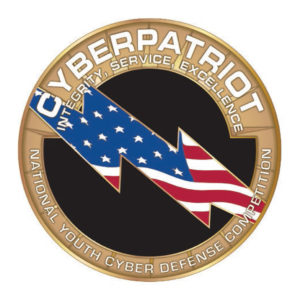Encouraging STEM interest in Cheyenne through cyber-security competition
Students in rural Cheyenne don’t always have clear career pathways or access to learning digital skills. Having a skilled high-tech workforce is of particular importance in Wyoming, which ranks 49th in cyber hygiene rankings. Opportunities to learn these and other valuable skills are available, but can be difficult to access in this remote area.

Encouraging STEM interest through competition
In the spirit of sparking STEM interest, three Cheyenne JROTC teams (a total of 37 students) participated in the National Youth Cyber Defense Competition thanks to funding from a Microsoft grant. The competition is run by an award-winning United States Air Force program called CyberPatriot, part of the National Youth Cyber Education Program. According to Jim Johnson, Microsoft Leadership Development Program Manager and CyberPatriot mentor, “It’s been growing really fast and going really well, especially with the support of Microsoft grants.”
Microsoft worked in partnership with the Cheyenne Schools Foundation to support CyberPatriot’s curriculum and to provide grant money and educational opportunities in one of its datacenter communities. A $15,000 award helped defer the cost of the three Cheyenne teams, including registration fees and meals. Additionally, students were transported to and from field tours of Cheyenne’s largest employer, Warren Air Force Base, which oversees the nation’s Intercontinental Ballistic Missile fleet. These visits helped drive engagement across the community and gave students exposure to military career options.
Sparking cybersecurity learning on virtual systems
The National Youth Cyber Defense Competition challenges teams of high school and middle school students to act as newly hired IT professionals tasked with managing the network of a small company. The competition, designed for any student regardless of prior cybersecurity knowledge, raises awareness around the need for better cybersecurity and helps students learn how to fix vulnerabilities once they are found.
Through several rounds of competition, teams are presented with a set of virtual images that represent operating systems and must identify the cybersecurity vulnerabilities within the images. Once vulnerabilities are found, teams must harden the system while simultaneously maintaining critical services over a six-hour period. Scores are then given based on how secure the system is made. Teams first compete for top placement within their state and region, with top teams in the nation earning all-expenses paid trips to Maryland to compete head-to-head in the National Finals Competition. Winners earn national recognition and scholarship money.
Through exposure to both the Warren AFB and datacenter employees, participants in Cheyenne gained visibility into available career pathways, developed digital skills, and learned the importance of cybersecurity. The program continues to grow, as Johnson explains. “We had one team the first year, then we did a summer camp and brought in all kinds of speakers from the community talking about career pathways. We had two teams this past year, 8 to 10 students, and the latest summer camp involved students from South Dakota and Colorado, which really just propelled us to the next level. It’s ripe for community engagement, statewide engagement, and partnering with Microsoft.”
Developing leadership and citizenship with JROTC
Cheyenne Central High School is home to the country’s oldest Junior Reserve Officers’ Training Corps (JROTC), dating back to 1903. Since 1973, JROTC has been open to women, who now make up half of Central High School’s program. As members of JROTC, cadets attend a class each day to learn about important life skills like investing in a retirement fund, setting goals, buying a home, and maintaining a healthy lifestyle. Additionally, participants learn military history, marching in formation (drill), and orienteering; combat and combat-related skills are not part of the program. The JROTC’s mission is “to motivate young people to be better citizens” through learning experiences that can be applied to real-life situations.
The skills learned in JROTC can be useful when seeking future employment, and many of the traits are desirable to tech employers. Says Johnson, “This is what inspires the students—hands-on experience doing something useful with their skills. It gives them the chance to run scenarios and drills on fake systems and they love it. We talk a lot about the ethics of cyberdefense. And we brought in someone from the bank, the police department, the local base, so students got to hear that if they like IT, they can do it in the Navy, they can do it at the local bank, they can do it in the Air Force, I can do it working for the school district. They got to hear all those different perspectives. What better way to show them that there’s career options in information technology than through something like this?”
Thomas Johnson, the CyberPatriot team coach and Jim Johnson’s father, hopes to work with local organizations to expand offerings, including STEM-related apprenticeships to students. Johnson also looks to work with Laramie County Community College, another Microsoft partner, to create a more defined educational and career path for participants in the future.

